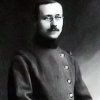Max Stirner

Max Stirner
Johann Kaspar Schmidt, better known as Max Stirner, was a German philosopher. He is often seen as one of the forerunners of nihilism, existentialism, psychoanalytic theory, postmodernism, and anarchism, especially of individualist anarchism. Stirner's main work is The Ego and Its Own, also known as The Ego and His Own. This work was first published in 1845 in Leipzig, and has since appeared in numerous editions and translations...
NationalityGerman
ProfessionPhilosopher
Date of Birth25 October 1806
CountryGermany
Feuerbach ... recognizes ... "even love, in itself the truest, most inward sentiment, becomes an obscure, illusory one through religiousness, since religious love loves man only for God's sake, therefore loves man only apparently, but in truth God only." Is this different with moral love? Does it love the man, this man for this man's sake, or for morality's sake, for Man's sake, and so-for homo homini Deus-for God's sake?
The object of the state is always the same: to limit the individual, to tame him, to subordinate him, to subjugate him.
Nothing is more to me than myself.
It is not recognized in the full amplitude of the word that all freedom is essentially self-liberation - that I can have only so much freedom as I procure for myself by my owness.
The difficulty in our education up till now lies, for the most part, in the fact that knowledge did not refine itself into will, to application of itself, to pure practice. The realists felt the need and supplied it, though in a most miserable way, by cultivating idea-less and fettered "practical men." Most college students are living examples of this sad turn of events. Trained in the most excellent manner, they go on training; drilled they continue drilling.
Whoever is a complete person does not need to be an authority.
Whoever knows how to take, to defend, the thing, to him belongs property.
Crimes spring from fixed ideas.
People is the name of the body, State of the spirit, of that ruling person that has hitherto suppressed me.
Thus the radii of all education run together into one center which is called personality.
One is not worthy to have what one, through weakness, lets be taken from him; one is not worthy of it because one is not capable of it.
What I have in my power, that is my own. So long as I assert myself as holder, I am the proprietor of the thing.
Is not all the stupid chatter of most of our newspapers the babble of fools who suffer from the fixed idea of morality, legality, christianity and so forth, and only seem to go about free because the madhouse in which they walk takes in so broad a space?
The moral man is necessarily narrow in that he knows no other enemy than the immoral man. He who is not moral is immoral! and accordingly reprobate, despicable, etc. Therefore, the moral man can never comprehend the egoist.